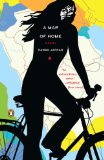Summary | Excerpt | Reading Guide | Reviews | Beyond the Book | Read-Alikes | Genres & Themes | Author Bio

This article relates to A Map of Home
Arabic Music is influenced by a history of conquest and contact with numerous countries including but not limited to Greece, Medieval Europe and Turkey. Elements of Arabic music can also be found in non-Arabic countries. A few common characteristics are the connection between music and poetry, and the use of maqamat. In Arabic music, a maqam (plural maqamat) is a set of notes. The nearest equivalent in Western classical music would be a mode.
Traditional instruments include:
For extensive information on all these instruments, visitmaqamworld.com.
Two of Nidali's favorite singers are Umm Kulthoum and Fairuz, women renowned throughout the Arabic world.
Umm Kulthoum (1904-1975), born of humble origins,
was an actress, musician, singer and public figure whose
career would be as entwined with her native Egypt as Edith
Piaf's was with France. Her songs often encompassed Arabic
poetry, working class themes and love and were widely
broadcast on the radio.
Fairuz (sometimes spelled Fayrouz or Fairouz) was
born in 1935 as Nouhad Haddad. She is a
Lebanese singer and actress who rose to prominence in the
1960's and '70s and has received international acclaim. Her
collaborations with the Rahmani brothers, a composer and
lyricist, represented some of the most popular songs of the
time. According to the Encyclopedia of World Biography, she
sang "of love and the simple life, of love of country, and
of the longing for a lost Jerusalem; she sang old bedouin
chants and obscure shepherd's songs; she brought back the
muashahat, a musical form first heard in the gardens of
Andalusia; she interpreted the quasida and the
nashid, two highly structured lyrical verse forms and,
with equal success, the improvisational vocal expressions
known as the mawal and meyjana." View her
singing at
YouTube.
Filed under Music and the Arts
![]() This "beyond the book article" relates to A Map of Home. It originally ran in October 2008 and has been updated for the
August 2009 paperback edition.
Go to magazine.
This "beyond the book article" relates to A Map of Home. It originally ran in October 2008 and has been updated for the
August 2009 paperback edition.
Go to magazine.
The single biggest problem in communication is the illusion that it has taken place
Click Here to find out who said this, as well as discovering other famous literary quotes!
Your guide toexceptional books
BookBrowse seeks out and recommends the best in contemporary fiction and nonfiction—books that not only engage and entertain but also deepen our understanding of ourselves and the world around us.